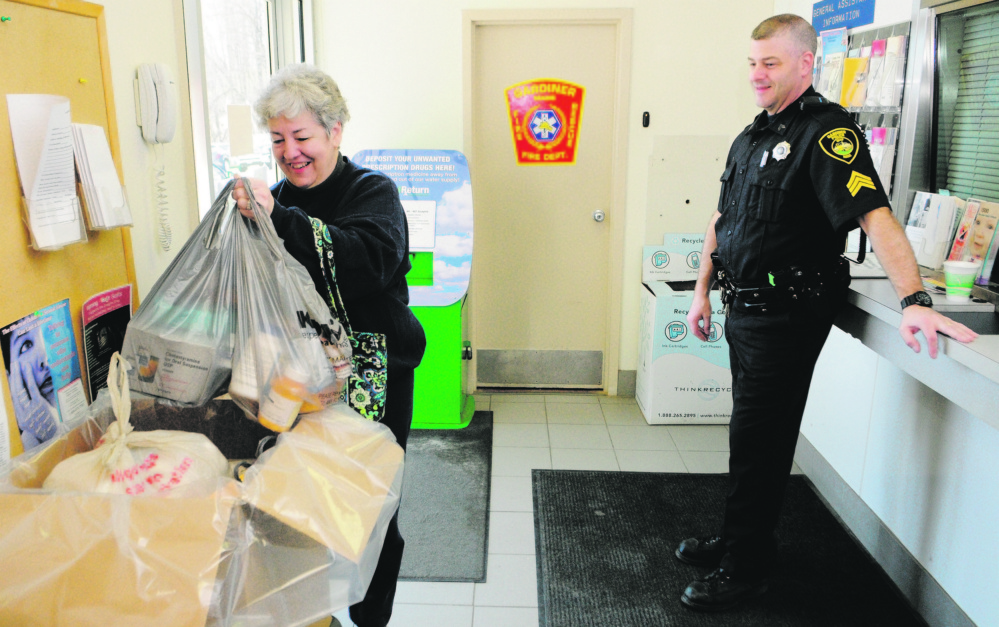Sheriff departments in the state are taking over a campaign to collect unused and expired prescription drugs after the federal Drug Enforcement Agency said it doesn’t have the money to continue National Prescription Drug Take-Back Day.
The national drug take-back effort is being discontinued at the federal agency after about four years of drug collection on designated days in the spring and fall.
Some police departments and sheriff’s offices around the country have declined to take over the program because don’t have the money either, said Matt Barden, a spokesman for the Drug Enforcement Agency.
The Maine Sheriff’s Association has said it will continue the program and plan to host a drug take-back day on April 25, according to a press release from Somerset County Sheriff Dale Lancaster. Lancaster said the effort with include every sheriff department in the state.
In Somerset County, running the program will be a shared cost between the sheriff’s office and several other agencies that the sheriff’s office is working with on the take-back, including the Skowhegan barracks of the state police, Madison Police Department and the U.S. Border Patrol station in Jackman, he said.
“If we can get those prescription drugs that people no longer need or that are expired off the street and disposed of correctly, it would be well worth it,” Lancaster said.
The change is also related to a law passed in September that authorizes hospitals, clinics and pharmacies in addition to police departments to run their own drug take-back programs.
National Prescription Drug Take-Back Day was started in 2010 by the DEA with the aim of reducing the number of unused prescription drugs on the street.
Barden said, “When everybody in the country realized there was a pharmaceutical drug epidemic going around the country and people had no safe avenue other than to dump it into their toilet or in the sink, then there were environmentalists coming out and saying this isn’t the safest thing for our environment, we said ‘What can we do?'”
“The first one in 2010 was supposed to be a one-time thing.”
The DEA was overwhelmed with the number of drugs it was receiving, and as a result the event has since been held twice per year, in the spring and fall, though there has never been federal funding for it. Since 2010, a total of 152,720 pounds of expired and unused drugs have been collected in the state of Maine through the program, according to Lancaster.
Under the new law, people can return unwanted prescription drugs throughout the year at designated locations, so long as there are police departments, pharmacies and other agencies that are willing to run the programs, Barden said.
“Not that money should prevail over any of this, but when you’re talking about millions of dollars for every event, it became quite costly for something that was not funded into our budget,” Barden said. “At the end of the day people having an avenue to take their prescription drugs to every day beats every six months all day long.”
He said it’s understandable that some agencies across the country don’t have the money to participate.
“There’s a lot to taking those in,” Barden said. “We know that when you take stuff in like that you’re taking in schedule one and schedule two drugs that have to be secured by law. It’s just not dumping it into a bag in a cardboard box, there are still a lot of security requirements.”
Lancaster said he did not have an estimate on the cost of running the program but that it should be minimal.
In addition to the scheduled take-back next Saturday, April 25, he said the Somerset County Sheriff’s Office plans to expand the number of take-back opportunities and is taking back drugs from places like nursing homes and even private residences if people call and ask.
“The cost is justified because we are able to take old prescriptions and make sure they are properly disposed of,” he said.
Rachel Ohm — 612-2368
Twitter: @rachel_ohm
Copy the Story LinkSend questions/comments to the editors.




Success. Please wait for the page to reload. If the page does not reload within 5 seconds, please refresh the page.
Enter your email and password to access comments.
Hi, to comment on stories you must . This profile is in addition to your subscription and website login.
Already have a commenting profile? .
Invalid username/password.
Please check your email to confirm and complete your registration.
Only subscribers are eligible to post comments. Please subscribe or login first for digital access. Here’s why.
Use the form below to reset your password. When you've submitted your account email, we will send an email with a reset code.